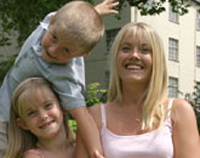 Long-term intensive care
Long-term intensive care
When Tanya Page regained consciousness in Royal Brompton’s Adult Intensive Care Unit (AICU), she was unaware that four months had elapsed since she had last spoken to her family.
“I honestly didn’t believe them when they told me I’d been unconscious for four months, she explains. “I thought it was the next day and that I was still in Haywards Heath – I made them go and buy me a newspaper to prove what they were saying was true!”
Tanya could remember being admitted to her local hospital with suspected pneumonia. But she had no idea that over the past 16 weeks her family had been called to the hospital three times when doctors feared they were losing the battle to save her, or that she had undergone an operation that offered just a ten percent chance of survival.
Severe lung damage
Dr Mark Griffiths, consultant physician in adult intensive care, explains: “By the time Tanya was referred to us, her lungs were as badly damaged as any we had ever treated. She had been unable to breathe unaided for two weeks already and the amount of fluid on her lungs was a constant hazard.”
A month later with no progress in sight, the situation deteriorated further when Tanya reacted badly to the move from AICU to have a scan, and Dr Griffiths was forced to perform an emergency procedure to drain fluid from her lungs.
“It was incredibly frustrating,” he remembers. “We were trying everything possible to improve the situation yet nothing seemed to have any effect. We thought we were about to lose her on several occasions yet she somehow managed to stay with us. Two months after we started treating her we’d had to insert a total of 18 chest drains to remove fluid from her lungs – I’d never seen a patient who was so ill survive so many interventions.”
Decision to operate
Two months down the line with Tanya’s lungs still critically damaged and weak, the team was running out of options. They decided to operate.
Mr George Laddas, consultant in thoracic medicine, explained to her family that while there was only a ten percent chance that she would survive the surgery, without it her chances of survival were even less.
Her family gave consent and endured an agonising wait. Against all the odds Tanya survived two intricate operations, and gradually over the following two months, her condition began to improve.
Improving condition
“I was completely unaware of all of this,” Tanya explains. “My poor family went through a traumatic four months. Mum and Dad came up to London three or four times a week to sit by my bed and talk to me. They had to balance all this with helping my husband look after our two small children – Hayley who was three and Jack who was just three weeks old when I was admitted.
One of the most difficult things for me when I woke up was to be presented with a blonde-haired four-month-old son – I’d last seen him when he was a tiny three week old baby with a mop of dark hair.”
Tanya speaks highly of the care she received: “I am not exaggerating when I say I have no bad memories of my time at Royal Brompton. There were some pretty horrible procedures I had to have, such as having my tracheotomy tube changed and having blood taken from veins that were weak from so many needles, but the care I received made up for everything.
Praise for staff
“It was honestly 110 percent all around. I got to know the staff really well during my time on the unit and I will never forget the kindness they showed both to me and my family. On Hayley’s fourth birthday, I was allowed to have a birthday party for her in my room – balloons, decorations, everything and someone even managed to get her a birthday cake. She really got to know the team well and they were very patient with her.”
Following several months’ rehabilitation Tanya is now at home and re-building her life. While frustrated at her level of fitness – she hopes to develop enough strength to jog and swim again – she has recovered with remarkable speed.
She left Royal Brompton attached to an oxygen cylinder, unable to feed herself, sit up without support, or lift a cup of tea.
Although it will wipe her out for days afterwards, she can now on special occasions, party with her friends until the early hours. “Treating Tanya was a learning experience for us all,” says Dr Griffiths. “Her condition presented us with real challenges and her resilience at times amazed us. But to see what her family went through for so many weeks, and then to see her recover from such a critical illness, was an incredible and rewarding experience.”
